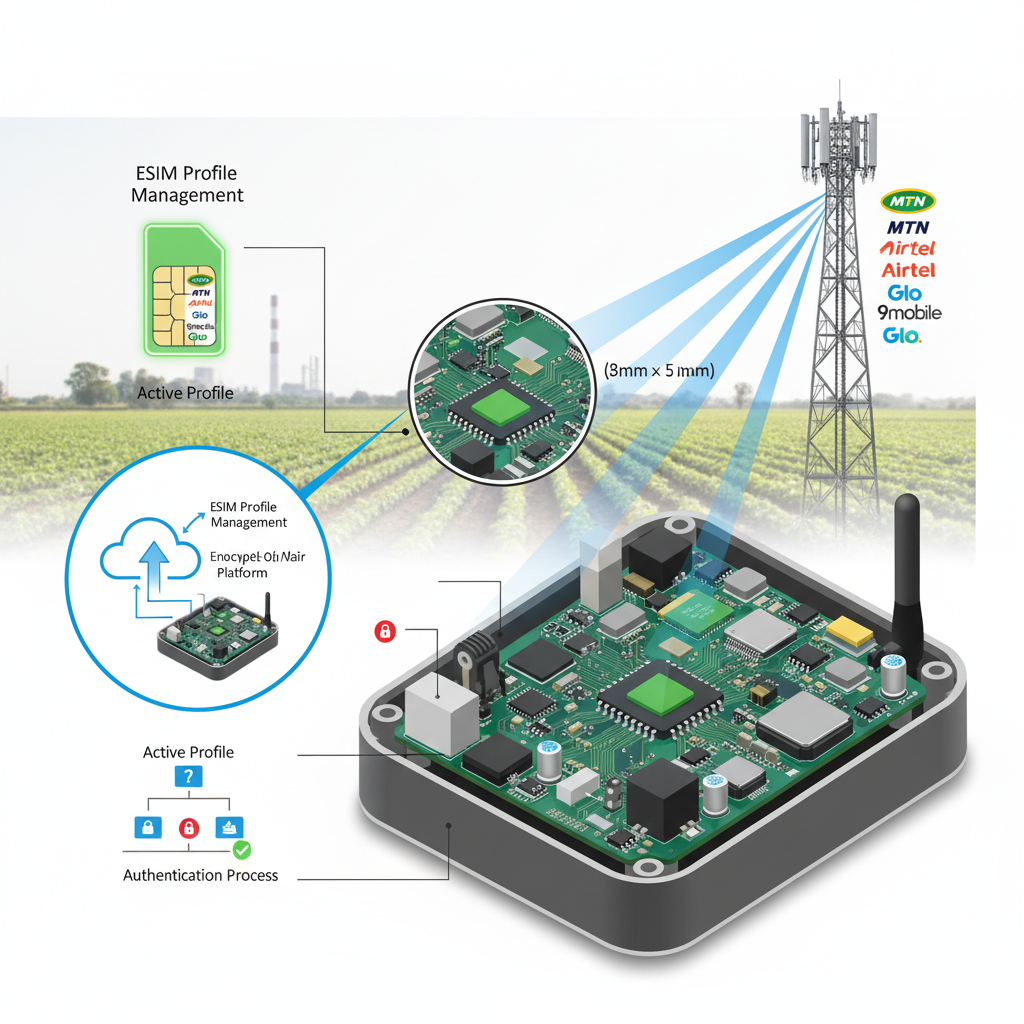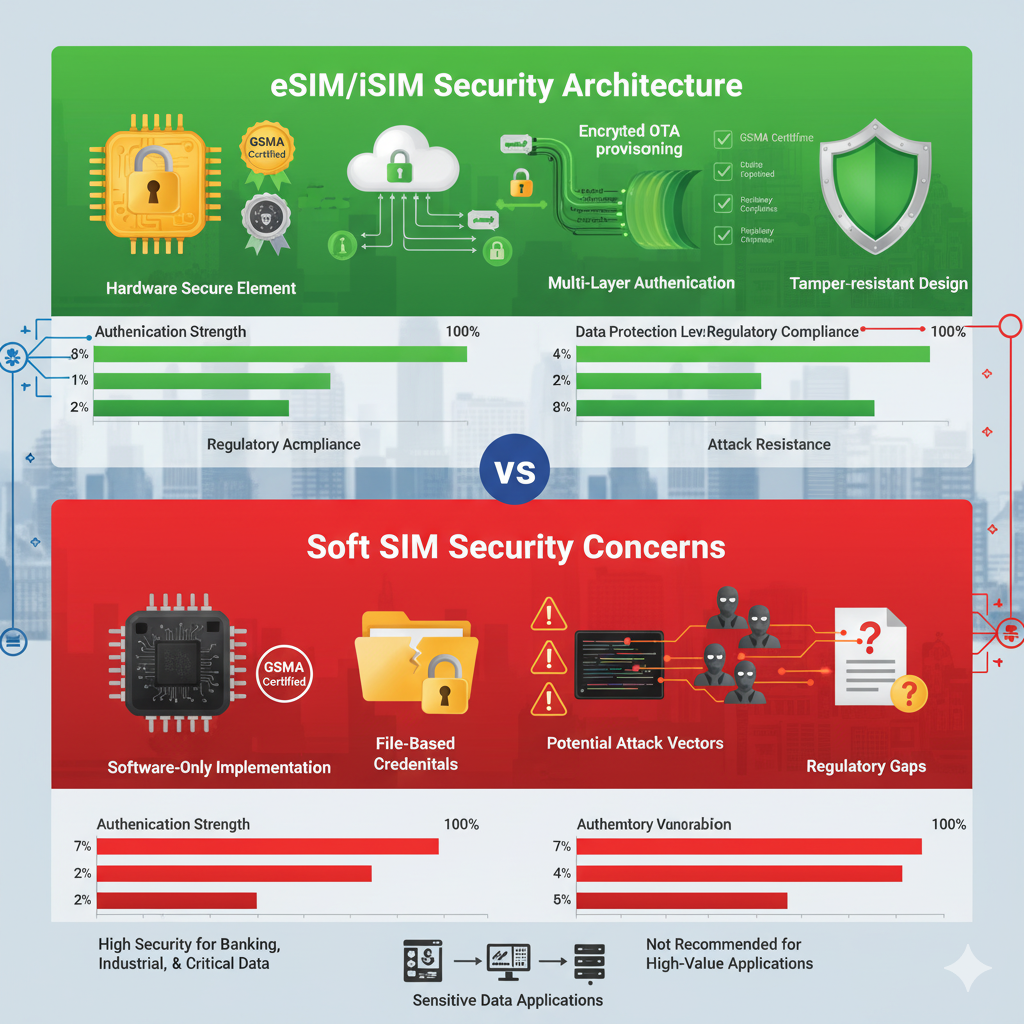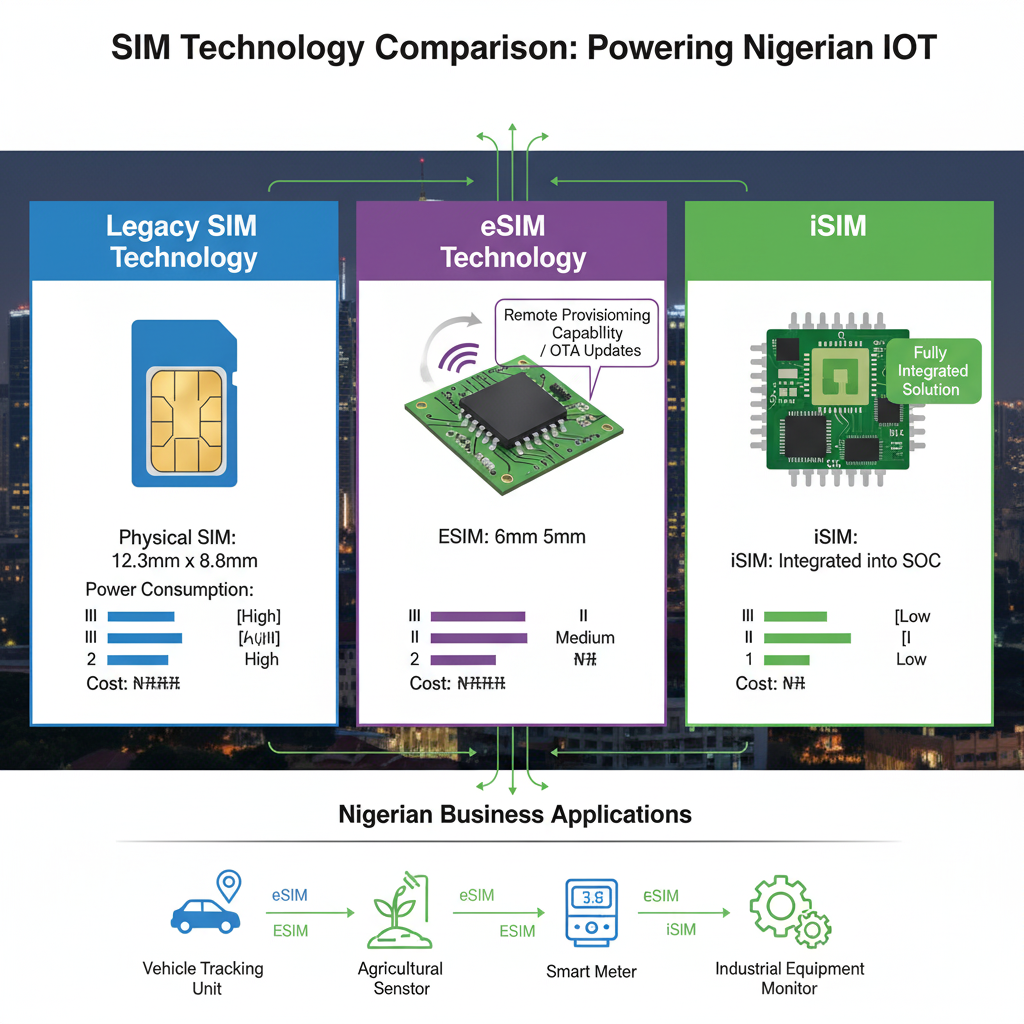Introduction: The Evolution of SIM Technology
In our increasingly connected world, IoT SIM cards play a vital role in enabling cellular communication across Nigerian businesses and African markets. However, traditional physical SIM cards are now being replaced by eSIM, iSIM, and Soft SIM technologies. Furthermore, these newer alternatives offer flexibility, convenience, and exciting possibilities for Nigerian enterprises and device manufacturers implementing IoT projects across challenging African telecommunications infrastructure.
The eSIM vs iSIM vs Soft SIM Nigeria decision significantly impacts device design, connectivity reliability, operational costs, and long-term scalability for businesses deploying IoT solutions across Lagos, Abuja, and other Nigerian markets. Moreover, understanding differences between these technologies enables informed decisions supporting successful implementations across diverse applications including fleet tracking, agricultural monitoring, smart energy systems, and industrial automation.
This comprehensive guide compares eSIM vs iSIM vs Soft SIM Nigeria technologies, exploring their features, benefits, advantages, and disadvantages specifically for Nigerian business contexts. Additionally, we’ll examine how each technology addresses unique African connectivity challenges and which solutions Genyz Solutions recommends for reliable, secure, and scalable IoT deployments across Nigeria and broader African markets.
1. What is an eSIM for Nigerian IoT?
Understanding eSIM Technology
An eSIM is a SIM card that uses remote SIM provisioning platforms and eUICC technology to update connectivity preferences and switch mobile network operator profiles over-the-air (OTA). Furthermore, eSIMs are available in any form factor and provide the same functionality as conventional SIMs with enhancements enabling secure, remote management crucial for Nigerian IoT deployments across diverse locations.
eSIM technology enables secure storage of multiple network profiles on eUICC SIMs. Moreover, this capability proves particularly valuable for Nigerian businesses requiring connectivity across MTN, Airtel, Glo, and 9mobile networks without physical SIM card replacement. Subsequently, remote provisioning allows businesses to change network operators or add new profiles without accessing devices deployed in remote agricultural regions, industrial facilities, or distributed urban locations.
The GSMA standardization of eSIM technology ensures interoperability across devices, networks, and management platforms. Additionally, this standardization provides Nigerian businesses with confidence in long-term technology viability and broad ecosystem support from device manufacturers, network operators, and connectivity providers like Genyz Solutions.
Advantages of eSIM for Nigerian Applications
eSIMs revolutionize connectivity and device design with their flexibility, security, and space-saving efficiency. Supporting over 130 international carriers, eSIMs enable seamless switching without physical SIM swaps. Furthermore, their space-saving feature, achieved by soldering the SIM onto circuit boards, eliminates physical SIM slots allowing more compact device designs or additional internal space for batteries extending operational life.
Security is enhanced through soldering which reduces physical tampering risks. Moreover, eSIMs employ stronger authentication mechanisms than traditional SIMs. The GSMA specification for remote provisioning involves secure cryptographic processes reducing unauthorized access risks and SIM cloning threats. Additionally, communication between eSIM and networks is encrypted making it challenging for attackers to intercept and manipulate data during transit.
With eSIMs, costs are reduced through streamlined manufacturing processes eliminating time and expense associated with fitting traditional SIMs. Furthermore, eSIMs offer increased durability and are less susceptible to physical damage or contact degradation compared to traditional SIMs using gold-plated spring contacts prone to corrosion in Nigerian environmental conditions.
Disadvantages and Considerations
Some MNOs and SIM resellers supply eSIMs as single IMSI cards. Without Remote SIM Provisioning (RSP) technology enabling remote profile management, Nigerian IoT initiatives risk being subjected to future data sovereignty legislation and permanent roaming restrictions potentially affecting cross-border operations in West Africa.
Soldering eSIM onto devices presents challenges for device disposal. However, the positives of this feature far outweigh negatives for most Nigerian IoT use cases requiring long-term deployments and enhanced security.

2. What is iSIM for Nigerian Deployments?
Understanding Integrated SIM Technology
iSIM, or Integrated SIM, takes the eSIM concept further by embedding SIM card functionality directly into modem chipsets. Furthermore, this integration brings greater control and flexibility to device manufacturers while maintaining eSIM technology benefits with additional advantages particularly relevant for Nigerian IoT deployments requiring extreme miniaturization, enhanced security, and maximum power efficiency.
By consolidating cellular modem and SIM into System on Chip (SoC), iSIM dramatically reduces footprint required for connectivity components. Moreover, this size reduction, up to 98% smaller than eSIMs, opens new possibilities for IoT device designs especially in Nigerian applications where space proves critical including wearable devices, small sensors, and compact tracking units.
iSIM technology represents the latest evolution in SIM technology with GSMA support ensuring industry standardization and broad ecosystem adoption. Additionally, Nigerian businesses implementing iSIM solutions position themselves at the forefront of IoT innovation while benefiting from proven, standardized technology supported by major chipset manufacturers and network operators.
Advantages of iSIM Technology
iSIM technology offers significant advantages in device design particularly regarding size, power efficiency, and ruggedness. The close integration of components enables more efficient operation reducing energy consumption while delivering power more effectively to SIM functionality. Furthermore, this synergy results in win-win situations for both power efficiency and overall device performance crucial for battery-powered Nigerian IoT deployments in remote locations.
iSIM enhances device ruggedness by minimizing discrete components reducing damage risk particularly in outdoor and challenging Nigerian environments. This feature makes iSIM-equipped devices more resilient to factors like water ingress, tampering, dust exposure, and adverse weather conditions common across Nigerian agricultural, industrial, and outdoor monitoring applications.
Overall, iSIM technology not only simplifies supply chains and reduces costs in Nigerian IoT deployments but also enhances hardware-based security acting as secure Root of Trust (RoT) for authentication and safeguarding sensitive data. Moreover, this security enhancement proves increasingly important as Nigerian businesses deploy IoT solutions for critical applications including financial services, energy management, and industrial control systems.
Disadvantages and Limitations
A potential disadvantage for some iSIMs is if reprogramming options are disabled. This would limit ability to change mobile network providers and optimize connectivity. However, properly implemented iSIM solutions from providers like Genyz Solutions maintain full reprogramming capabilities ensuring Nigerian businesses retain connectivity flexibility.
Much like eSIM, because iSIM cannot be removed, when IoT devices reach end of life, disposing of iSIM inside becomes difficult. From billing perspectives, this causes no issues as it’s extremely easy to deactivate SIMs ensuring no further charges are incurred once devices are switched off.
3. What is Soft SIM Technology?
Understanding Software-Based SIM
Soft SIM, also known as virtual SIM or software SIM, is entirely software-based method of storing and displaying subscriber identity information to modems. Furthermore, unlike eSIM and iSIM which use certified hardware secure elements, Soft SIM implements SIM functionality purely through software running on device microcontrollers.
To identify subscribers, Soft SIM can be supplied as file with unique security and identity information enclosed. For users, this may appear more convenient and promote easier device configuration. Additionally, Soft SIM allows manufacturers to simplify supply chain processes as they can replace need to physically handle and distribute SIM cards with programming step during production.
Advantages of Soft SIM
Soft SIM offers advantages in two key areas for Nigerian device manufacturers. First, convenience in subscriber identification through file-based provisioning potentially simplifies device configuration and reduces logistical complexity associated with physical SIM distribution across Nigerian manufacturing and deployment sites.
Secondly, Soft SIM allows manufacturers to simplify supply chain processes replacing physical SIM card handling and distribution with software programming steps during production. This could potentially reduce costs and complexity for Nigerian IoT device manufacturers producing large volumes of connected devices.
Critical Disadvantages and Security Concerns
Nigerian organizations planning to use Soft SIMs for IoT deployments should exercise significant caution since it represents emerging, early-stage technology coming with inherent challenges. Notably, the GSMA has not approved industry standardization of Soft SIM. Because it lacks approval from known regulatory bodies, it’s not subject to regulation or held to industry standards.
Furthermore, without regulatory body assurance, the technology presents interoperability challenges due to different implementation approaches and fails to reach mass adoption like eSIM and iSIM. Another critical concern revolves around remote SIM provisioning (RSP), a protocol outlined by GSMA for downloading SIM profiles.
With Soft SIMs, identity and security keys are provided by file sets run on microcontrollers, so data can always be changed with firmware updates either by local reprogramming or downloading new firmware images over-the-air. This presents significant problems for Nigerian businesses requiring secure, reliable connectivity.
In absence of regulatory oversight, Soft SIM lacks adherence to remote SIM provisioning standards which heightens security risks. Process data files should be unique and used only once because they contain credentials devices use to authenticate with MNOs. Soft SIM presents potential security vulnerabilities and credential misuse if unique information is altered.
Finally, GSMA emphasizes that secure elements based on certified hardware and software are crucial for robust SIM security. Soft SIM, lacking such certification, exposes Nigerian IoT data to potential attacks risking loss of customer confidence in operator systems. Both operators and Nigerian enterprises should beware of threats inherent with Soft SIM technology.

4. eSIM vs iSIM vs Soft SIM Nigeria: Technology Comparison
Standardization and Regulatory Compliance
The eSIM vs iSIM vs Soft SIM Nigeria comparison reveals critical differences in regulatory approval and industry standardization. Both eSIM and iSIM technologies follow GSMA standards ensuring interoperability, security, and broad industry support. Furthermore, these standardized technologies receive endorsement from Nigerian Communications Commission and global regulatory bodies providing confidence for business deployments.
In contrast, Soft SIM lacks GSMA standardization and regulatory approval. This absence creates significant risks for Nigerian businesses including potential interoperability issues, security vulnerabilities, and uncertain long-term viability. Moreover, tier 1 network operators rarely enable Soft SIM connectivity due to security concerns and lack of certification.
Security and Reliability Considerations
Security represents paramount concern for Nigerian IoT deployments across banking, energy, manufacturing, and other critical sectors. eSIM and iSIM technologies incorporate hardware-based secure elements with certified security implementations meeting international standards for authentication, encryption, and tamper resistance.
Soft SIM’s software-only approach lacks certified security mechanisms exposing Nigerian businesses to potential credential theft, unauthorized access, and data breaches. Furthermore, without hardware secure elements, Soft SIM cannot provide the robust security required for mission-critical Nigerian applications or compliance with evolving data protection regulations.
Cost and Implementation Factors
While Soft SIM may appear cost-effective initially due to simplified supply chains, the security risks and lack of standardization create hidden costs including potential breaches, system failures, and future migration expenses. Furthermore, Nigerian businesses must consider total cost of ownership including security, reliability, and long-term support when evaluating technologies.
eSIM and iSIM represent proven, secure, cost-effective solutions for Nigerian IoT deployments. Additionally, economies of scale in eSIM/iSIM production combined with broad industry adoption ensure competitive pricing while delivering certified security and reliability essential for business-critical applications.
5. Nigerian Use Cases and Recommendations
Banking and Financial Services
Nigerian banks including FCMB and Wema Bank require highest security standards for IoT deployments supporting ATM networks, payment terminals, and branch security systems. Furthermore, eSIM and iSIM technologies provide certified security meeting regulatory requirements while enabling reliable connectivity across MTN, Airtel, Glo, and 9mobile networks.
Genyz Solutions recommends eSIM or iSIM implementations for all Nigerian financial services applications. Moreover, our universal SIM solutions combine eSIM technology with multi-network capabilities ensuring consistent connectivity and certified security protecting sensitive financial data and transactions.
Agricultural and Environmental Monitoring
Nigerian agricultural operations deploy thousands of sensors monitoring soil conditions, weather, irrigation systems, and livestock across remote locations. Furthermore, these deployments require cost-effective, power-efficient connectivity solutions operating reliably for years without maintenance.
eSIM technology proves optimal for Nigerian agricultural IoT providing excellent balance of cost, power efficiency, and reliability. Additionally, remote provisioning capabilities enable network optimization and troubleshooting without physical device access crucial for sensors deployed across vast farming operations in Kano, Plateau, and Benue states.
Industrial and Manufacturing Applications
Nigerian manufacturing facilities in Kaduna, Lagos, and other industrial centers require reliable IoT connectivity for equipment monitoring, quality control, and automation systems. Furthermore, iSIM technology offers advantages for space-constrained industrial sensors and control devices requiring maximum ruggedness and minimal power consumption.
For larger industrial devices, eSIM provides excellent connectivity with proven reliability and security. Moreover, Genyz Solutions offers comprehensive implementation support ensuring Nigerian manufacturers select optimal SIM technology for specific application requirements and operational conditions.
Fleet Tracking and Logistics
Nigerian logistics companies operate vehicles across diverse routes encountering varying network coverage and challenging environmental conditions. Furthermore, vehicle tracking devices require reliable, cost-effective connectivity with excellent power efficiency supporting years of operation.
eSIM technology represents the preferred solution for Nigerian fleet tracking providing certified security, multi-network capability through Genyz Solutions’ universal SIM offerings, and proven reliability across millions of deployed devices. Additionally, remote provisioning enables efficient fleet management and connectivity optimization without vehicle downtime.
6. Genyz Solutions: Certified SIM Technology for Nigerian Success
Our Technology Approach
Genyz Solutions specializes in providing certified, regulated SIM technologies following industry standards. Furthermore, we offer eSIM and iSIM solutions delivering secure, reliable connectivity for Nigerian IoT projects across all industries and applications. Our firm belief is that regulated technology following industry standards should be used for business-critical deployments.
For that reason, we do not offer Soft SIM solutions. Instead, we focus on proven technologies certified by GSMA and supported by global ecosystem of device manufacturers, network operators, and connectivity platforms ensuring long-term viability and security for Nigerian businesses.
Advanced Connectivity Solutions
The connectivity landscape constantly changes and Nigerian businesses don’t need to invest in unregulated technologies to achieve ultra-reliable, global IoT connectivity. Furthermore, Genyz Solutions continuously innovates using industry-approved technologies ensuring our customers benefit from latest advancements while maintaining security and standardization.
Our universal SIM solutions combine eSIM technology with multi-IMSI capabilities enabling automatic switching between MTN, Airtel, Glo, and 9mobile networks. Moreover, this delivers near 100% uptime for Nigerian IoT deployments while maintaining certified security and regulatory compliance essential for business operations.
Comprehensive Support Services
Genyz Solutions provides comprehensive support for Nigerian businesses implementing eSIM and iSIM technologies. Our services include technology selection guidance, implementation support, connectivity management platforms, and ongoing technical assistance ensuring successful deployments and optimal performance.
Our M2M connectivity Africa expertise and deep understanding of Nigerian telecommunications challenges enable us to deliver solutions specifically optimized for African market conditions. Additionally, local support teams provide rapid response to technical issues and proactive monitoring ensuring Nigerian businesses achieve maximum value from IoT investments.
7. Implementation Guide for Nigerian Businesses
Technology Selection Process
Selecting between eSIM and iSIM for Nigerian applications requires careful evaluation of specific requirements including device size constraints, power budgets, environmental conditions, and security needs. Furthermore, Genyz Solutions provides consultation services helping Nigerian businesses identify optimal technologies for their unique operational scenarios.
For most Nigerian IoT projects, eSIM represents the optimal choice combining proven technology, broad device support, competitive costs, and excellent reliability. However, applications requiring extreme miniaturization, maximum power efficiency, or highest ruggedization may benefit from iSIM technology where available.
Deployment Best Practices
Successful eSIM or iSIM implementation begins with comprehensive planning addressing connectivity requirements, network coverage analysis, security protocols, and device management strategies. Furthermore, Nigerian businesses should conduct pilot programs validating technology performance in actual operational conditions before large-scale deployments.
Genyz Solutions provides implementation support including device configuration, connectivity provisioning, platform integration, and staff training ensuring Nigerian businesses rapidly achieve operational status and begin realizing IoT benefits. Moreover, our SIM management platforms enable centralized monitoring and control across thousands of devices simplifying ongoing operations.
Long-Term Management
eSIM and iSIM technologies enable remote management capabilities essential for large-scale Nigerian IoT deployments across distributed locations. Furthermore, over-the-air provisioning supports network optimization, security updates, and configuration changes without requiring physical device access reducing operational costs and improving reliability.
Regular monitoring of connectivity performance, security status, and device health enables proactive issue identification and resolution. Additionally, Genyz Solutions’ management platforms provide comprehensive visibility and control supporting efficient operations throughout IoT device lifecycles.
Conclusion: Choosing Certified Technology for Nigerian IoT Success
The eSIM vs iSIM vs Soft SIM Nigeria comparison reveals clear distinctions between certified, secure technologies (eSIM and iSIM) and unregulated alternatives (Soft SIM) lacking industry standardization. Furthermore, Nigerian businesses deploying IoT solutions for critical applications must prioritize certified technologies ensuring security, reliability, and long-term viability.
Genyz Solutions recommends eSIM or iSIM implementations for all Nigerian IoT projects providing proven performance, regulatory compliance, and comprehensive ecosystem support. Moreover, our universal SIM solutions deliver multi-network connectivity across Nigerian telecommunications infrastructure ensuring reliable operations supporting business success.
Transform Your IoT Connectivity Today
Contact Genyz Solutions for expert consultation on eSIM and iSIM technology selection, implementation strategies, and connectivity management tailored to your Nigerian business requirements.

